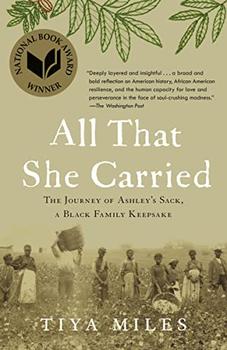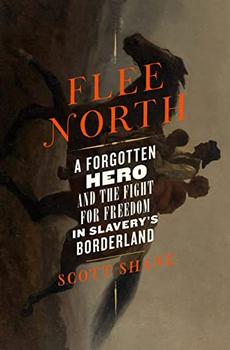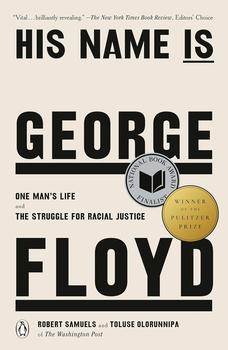Summary | Excerpt | Reviews | Beyond the book | Read-Alikes | Genres & Themes | Author Bio

Critics' Opinion:
Readers' Opinion:
First Published:
Jun 2021, 416 pages
Paperback:
Feb 2022, 416 pages
 Book Reviewed by:
Book Reviewed by:
Valerie Morales
Buy This Book
For Rose of Charleston, South Carolina, it was an ordinary day until it wasn't. When it turned out that Ashley, Rose's beloved nine-year-old daughter and only child, was about to be sold, Rose went to work quickly. She assembled items for Ashley's relocation, laying them inside a cotton sack. The battered bag would be the last thing Rose touched that her daughter would know. It would change hands for the following 90 years, an inheritance from one generation to the next, a symbol of love and survivorship, slavery and family separation. For five years, Ashley's Sack would hang in a basement gallery at the National Museum of African American History and Culture in Washington, D.C. (see Beyond the Book). In 2022, its display is expected at the International African American Museum in Charleston, South Carolina.
The story of the old cloth and its ancestral meaning is told in All That She Carried: The Journey of Ashley's Sack, a Black Family Keepsake. Harvard historian Tiya Miles has written a fierce chronicle of resistance and maternal love in a time of grief and family separation, when many children were sold at night while their parents were sleeping and could do nothing to stop the kidnapping.
Rose was a mid-20s woman when she gave birth in 1844 to daughter Ashley, possibly named after the Ashley River (the place where Europeans first settled in South Carolina). Ashley was often separated from her mother and sent to work inland at a rice plantation, while Rose remained in Charleston, worrying about whether her daughter was safe. In 1853, when Rose discovered Ashley was soon to be sold, or, as Miles puts it, when she was in a "fix," she was practical.
The bag Rose chose was two feet long and one foot wide, an ivory white color, a seed sack. Inside she put a thin dress, three handfuls of pecans and a piece of her own hair braid. Over time, the sack was passed down from one daughter to the next as the living became the deceased. When the antique sack was in the hands of Ashley's granddaughter in the early 1920s, Ruth Middleton lovingly embroidered the family history upon the outside for all to see:
My great grandmother Rose
mother of Ashley gave her this sack when
she was sold at age 9 in South Carolina
it held a tattered dress 3 handfulls of
pecans a braid of Roses hair. Told her
It be filled with my Love always
She never saw her again
Ashley is my grandmother
Ruth Middleton
1921
I visited the National Museum of African American History and Culture the second day it opened, and Ashley's Sack was surrounded by a crowd. In front of me I heard a lot of sobs. The imagery of the lines in the embroidery was poignant. Rose telling Ashley goodbye and then handing her the bag, saying it was filled with Rose's love for her, as if love was coffee beans. Nearby, an auction block reinforced the point of Ashley as property. It was a piercing exhibit of love and loss.
Miles' retelling is similarly haunting. She describes Charleston as a city of white rice and black bodies. On one street was a slave auction. On another, the gossipy affluent. A flamboyant city, slaveholding was responsible for most of Charleston's wealth and much of its cruelty. Atrocities surround and shape the story Miles tells with a historian's detail. For example, she recounts the situation of a 12-year-old boy who was caring for a white baby. When he accidentally fell asleep, his skin touched the infant. The woman who owned him beat him so severely he died, days later. Stories like this fill out the book and give it authenticity, but all roads lead back to Rose.
Rose's sack was a repository for tangible things and a container of intangible dreams. The sack had a white mouth and a white body. Rose had a brown mouth and a brown body. The sack opened and it closed. Slavery closed and rarely did it open. When she gave the sack to Ashley, Rose was putting something illegal into her daughter's hand, because property was not allowed to own property.
A few years ago, it became politically popular to say, "Nevertheless, she persisted." After the murder of Breonna Taylor, the slogan chanted in crowds was "Say her name." In a grand example of the past being prologue, the slave Rose persisted. And her great-granddaughter Ruth said her name. The story of Ashley's Sack is a poetic example of how separation is not always true separation. Ancestors are the tree, their descendants the sweet fruit who ripen after loss and despair.
In the year 2007, the sack was discovered in a flea market bin by a white woman who purchased it for $20. She did her own detective work and offered it to Middleton Place, a non-profit foundation that was once the home of wealthy slave owners, for a small sum and a lifetime membership at the museum. In 2016, the sack made the trip to the National Museum of African American History and Culture. Perhaps some of those who hung around its display experienced Rose as a shimmering good mother, imagining what they might have done in her place. But, of course, that's a foolish calculus of the privileged. The lives of the unfree, in bondage, can't be replicated.
The conversation that should be had after viewing Ashley's Sack is how black women slaves transferred love despite living through perversions, violence and endless work. How they desired freedom even as they didn't expect it. How they maneuvered, saved one another, sewed up wounds and mothered. It is these conversations Tiya Miles has triggered with this holy work. One of my favorite lines in the book reads, "Who was Rose? We know at least this: Rose refused to submit to the lie that said she had no right to love her daughter."
Rose was a tender mother, and that is at the heart of Miles' story, which is enormous not because of its 400+ pages but because of its artifacts, tales, tragedy and atrocities. Peeling back the racial onion is a sacred act of resistance. The heroism alone of how Rose loved a child when she herself was damaged is beautiful.
Reading this seminal work left me, frankly, speechless. A liberation document incredibly researched, Miles bestows upon black women an honor that society has often neglected: the impact of motherhood, daughtering and migration. She layers the experience by embracing the enslaved who continued to love the unseen, the gone, the sold and the missing, years after their departure. It needs repeating: Loving a child when you are damaged is beautiful.
![]() This review
first ran in the August 4, 2021
issue of BookBrowse Recommends.
This review
first ran in the August 4, 2021
issue of BookBrowse Recommends.

If you liked All That She Carried, try these:

by Scott Shane
Published 2024
A riveting account of the extraordinary abolitionist, liberator, and writer Thomas Smallwood, who bought his own freedom, led hundreds out of slavery, and named the underground railroad, from Pulitzer Prize-winning author and journalist, Scott Shane. Flee North tells the story for the first time of an American hero all but lost to history.

by Robert Samuels, Toluse Olorunnipa
Published 2024
A landmark biography by two prizewinning Washington Post reporters that reveals how systemic racism shaped George Floyd's life and legacy - from his family's roots in the tobacco fields of North Carolina, to ongoing inequality in housing, education, health care, criminal justice, and policing - telling the singular story of how one man's tragic ...





The House on Biscayne Bay
by Chanel Cleeton
As death stalks a gothic mansion in Miami, the lives of two women intertwine as the past and present collide.

The Flower Sisters
by Michelle Collins Anderson
From the new Fannie Flagg of the Ozarks, a richly-woven story of family, forgiveness, and reinvention.

The Funeral Cryer by Wenyan Lu
Debut novelist Wenyan Lu brings us this witty yet profound story about one woman's midlife reawakening in contemporary rural China.
Your guide toexceptional books
BookBrowse seeks out and recommends the best in contemporary fiction and nonfiction—books that not only engage and entertain but also deepen our understanding of ourselves and the world around us.